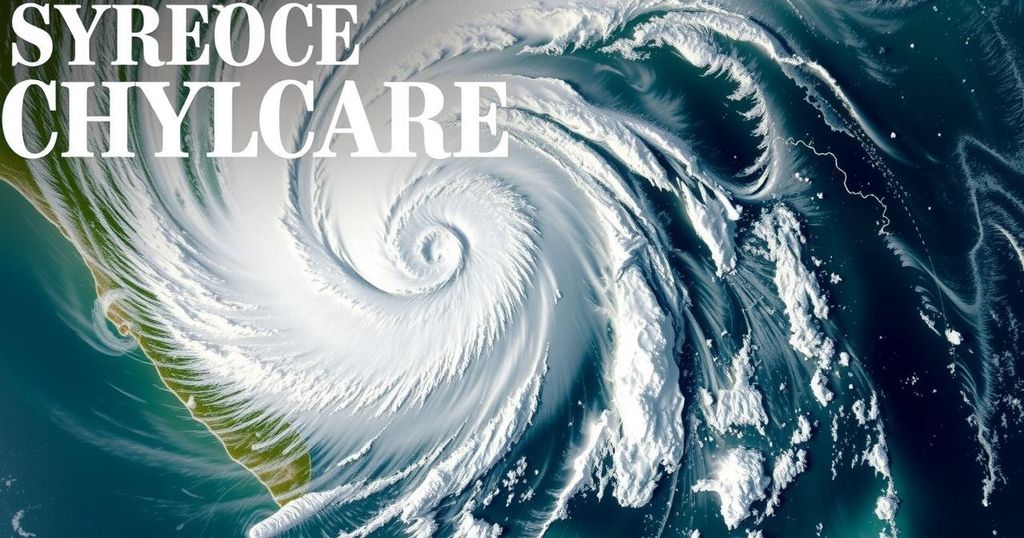Global news
AFRICA, BRUNO RETAILLEAU, CAPE TOWN, CHAD YOUYOU, EMERGENCY RESPONSE, EUROPE, EUROPEAN UNION, FRANCE, FRANCOIS BAYROU, FRANÇOIS BAYROU, FRENCH INTERIOR MINISTRY, FRENCH WEATHER SERVICE, INTERIOR MINISTRY, MAYOTTE, NATURAL DISASTER, NATURAL DISASTERS, RESCUE OPERATIONS, SOUTH AFRICA
Leila Ramsay
0 Comments
Cyclone Chido Devastates Mayotte, Leaves Death and Destruction in its Wake
Cyclone Chido has caused at least 11 fatalities in Mayotte and widespread damage before moving to Mozambique, potentially affecting 2.5 million people. Extensive destruction of infrastructure, including hospitals and homes, has been reported, prompting urgent aid efforts from France. Concerns are also growing for flooding and disease outbreaks in the wake of the cyclone’s path, highlighting the escalating impact of climate change on vulnerable populations.
Cyclone Chido has tragically resulted in the deaths of at least 11 individuals and inflicted significant devastation upon the impoverished French overseas territory of Mayotte in the Indian Ocean. After impacting Mayotte, the cyclone made landfall in Mozambique on the eastern coast of Africa. With expectations of affecting up to 2.5 million people in northern Mozambique, aid organizations have raised concerns regarding potential further casualties and severe damage. The French Interior Ministry is facing difficulties in obtaining an accurate count of casualties and injuries, although they confirmed 11 fatalities, with a hospital reporting nine critical cases and over 246 additional injuries.
Cyclone Chido, which struck on Friday and Saturday, also severely impacted nearby islands, including Comoros and Madagascar, where officials reported that 11 fishermen have gone missing. Authorities characterized the storm as the most severe cyclone to strike Mayotte in 90 years, as local infrastructure, including hospitals and the airport, faced substantial damage. French Interior Minister Bruno Retailleau expressed fears of rising death tolls and noted that the island had been devastated.
Chido produced wind speeds exceeding 220 kph (136 mph), categorizing it as a level 4 cyclone, the second strongest classification. France has pledged to establish an air and sea route to facilitate aid to Mayotte, which houses approximately 300,000 residents. The territory is marked by extreme poverty, and reports indicate that many homes have been obliterated, with countless trees uprooted and electricity disrupted.
In the aftermath, rescuers and firefighters have been dispatched from the mainland and the French territory of Reunion, with military aircraft and ships delivering urgent supplies. Damage to the airport’s control facilities has restricted flights to military operations only. Authorities aim to restore essential services, provide access to clean water, and prevent looting. French President Emmanuel Macron and Pope Francis have both expressed support and prayers for those affected.
As the cyclone progresses into northern Mozambique, concerns arise about the potential for flooding, prompting warnings of evacuations in Malawi and Zimbabwe. Damage reports from UNICEF indicate that Cabo Delgado province in Mozambique faces significant destruction to homes, schools, and healthcare facilities. The cyclone season from December to March has historically impacted southern Africa with severe storms, with last year’s Cyclone Freddy resulting in over 1,000 fatalities across multiple nations.
Studies attribute the worsening conditions of these cyclones to climate change, emphasizing the dire need for support from wealthier nations to assist impoverished countries grappling with climate impacts, despite contributing minimally to global warming.
The devastating impact of Cyclone Chido is reflective of increasing cyclone frequencies and intensities attributed to climate change. The cyclone season runs from December to March in the southeastern Indian Ocean, leading to potential humanitarian crises in affected regions such as Mozambique, Malawi, and Zimbabwe. Previous cyclones in recent years, such as Idai and Freddy, have had catastrophic consequences, stressing the importance of international support for vulnerable populations. As impoverished nations in southern Africa continue to face such crises, calls for adequate global assistance to address climate consequences intensify.
Cyclone Chido’s tragic aftermath highlights the profound humanitarian crises faced by communities in Mayotte and Mozambique. The extensive destruction, coupled with the ongoing threat of further flooding and disease outbreaks, necessitates urgent international aid and support. The increasing frequency and severity of such cyclones underscore the urgent need for comprehensive strategies to combat climate change, particularly in impoverished regions that lack the resources to recover independently. It is imperative that the global community responds fervently to mitigate the impacts of these natural disasters.
Original Source: time.com




Post Comment